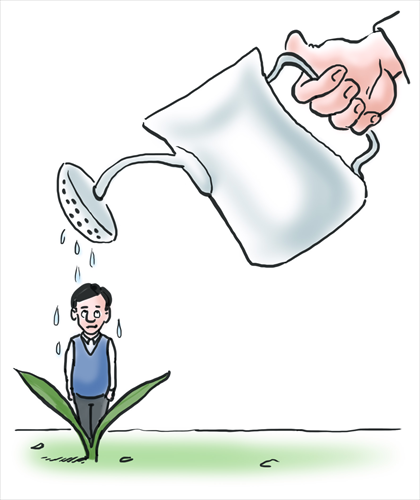HOME >> OP-ED
Welfare of North Koreans should be stressed
By Ding Gang Source:Global Times Published: 2014-12-3 23:48:01

Illustration: Liu Rui/GT
In recent days, there has been a heated debate on China-North Korean relations.
One side holds that China should not "give up" this close friend, otherwise the US may gain strategic interests it failed to obtain during the Korean War (1950-53). The other side maintains there is now no question of "abandoning" the North in China; instead, their bilateral ties should be established based on the norms governing the interaction between two normal states. According to them, Beijing should neither cozy up to nor give up on Pyongyang.
This controversy has again drawn public attention to Sino-North Korean ties. Nevertheless, both viewpoints are more relevant to how to cope with the US, but lack due consideration for the real interests of the North Korean people.
In the light of the series of challenges surrounding China, there is nothing wrong with giving top priority to safeguarding China's interests. But we need to take into account the interests of the general public in our peripheral countries so as to better protect our interests.
When talking about the Chinese dream, the Asian dream and the dream of the world, we refer to China's commitment to a peaceful development path and the common development of all the people in every country, including North Korea.
The US is working hard with its "rebalancing to Asia" policy by boosting relations with its military allies in the region.
It is apparent that this strategy mainly targets China, and hampers the common development of the region.
To disrupt Washington's ambitious "rebalancing to Asia" strategy, Beijing should refrain from a passive attitude.
With unprecedented economic development, China will inevitably see rising military power. Therefore it will be increasingly unlikely for any country to hedge against China on the military front. We should have confidence.
Consequently, when the US aims at counterbalancing a rising China with more military investment, we need to safeguard our own interests by not just building up certain military strength, but also sharing our dividends of peaceful development with peripheral states.
The initiative of "One Belt, One Road," which refers to the Silk Road economic belt and the 21st century Maritime Silk Road, was put forward due to such a strategic consideration.
The key to reconfiguring an Asian order lies in whether Asian nations can forge a community of common destiny, which depends on how we develop our neighborhood diplomacy to ensure common prosperity.
In the past, it might have been too naïve and too idealistic for us to produce such a vision, because we lacked sufficient national strength.
But now it's a different story. China's high-speed railways are extending to Southeast Asia; the Asian Infrastructure Investment Bank has been launched; and China has provided funds to help island nations in the South Pacific Ocean tackle the increasingly grave issue of climate change.
Just imagine, if North Korea becomes more open and its people enjoy the same living standard with their neighbors in the South with the help of China, what will people in other Asian nations think of us?
But if North Koreans are still plagued by backwardness and poverty, how can Washington's "rebalancing to Asia" strategy be broken up?
When many people in a neighboring country live in threat of starvation, some experts here are discussing how to build a strategic barrier against the US. But will the barrier be solid enough?
We should be more concerned about improving the living standard of North Koreans and helping the country develop the economy and integrate itself in the mainstream of Asia's development through reform and opening-up.
China is a core nation in this region. If it makes decisions and develops diplomatic ties in favor of the real interests of the general public in peripheral countries, they will have confidence in achieving common development with China.
In this way, the foundation for a new Asian order will gradually take shape.
The author is a senior editor with People's Daily. He is now stationed in Brazil. dinggang@globaltimes.com.cn. Follow him on Twitter at @dinggangchina
Posted in: Ding Gang, Viewpoint